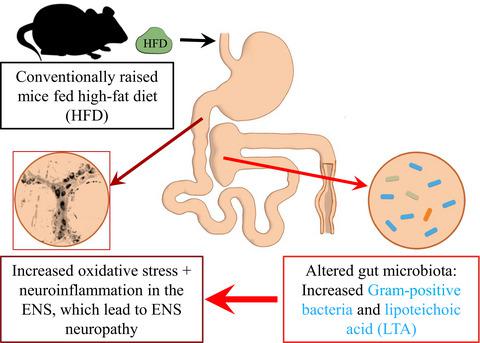当前位置:
X-MOL 学术
›
Neurogastroenterol. Motil.
›
论文详情
Our official English website, www.x-mol.net, welcomes your
feedback! (Note: you will need to create a separate account there.)
High-fat diet-induced alterations to gut microbiota and gut-derived lipoteichoic acid contributes to the development of enteric neuropathy.
Neurogastroenterology & Motility ( IF 3.5 ) Pub Date : 2020-03-13 , DOI: 10.1111/nmo.13838 Yvonne Nyavor 1 , Catherine R Brands 1 , George May 1 , Sydney Kuther 1 , Jessica Nicholson 1 , Kathryn Tiger 1 , Abigail Tesnohlidek 1 , Allysha Yasuda 1 , Kiefer Starks 1 , Diana Litvinenko 1 , David R Linden 2 , Yogesh Bhattarai 3 , Purna C Kashyap 2, 3 , Larry J Forney 1 , Onesmo B Balemba 1
Neurogastroenterology & Motility ( IF 3.5 ) Pub Date : 2020-03-13 , DOI: 10.1111/nmo.13838 Yvonne Nyavor 1 , Catherine R Brands 1 , George May 1 , Sydney Kuther 1 , Jessica Nicholson 1 , Kathryn Tiger 1 , Abigail Tesnohlidek 1 , Allysha Yasuda 1 , Kiefer Starks 1 , Diana Litvinenko 1 , David R Linden 2 , Yogesh Bhattarai 3 , Purna C Kashyap 2, 3 , Larry J Forney 1 , Onesmo B Balemba 1
Affiliation

|
High‐fat diet, microbial alterations and lipopolysaccharide (LPS) are thought to cause enteric diabetic neuropathy and intestinal dysmotility. However, the role of the gut microbiota, lipoteichoic acid (LTA) from Gram‐positive bacteria and short‐chain fatty acids (SCFAs) in the development of diabetic enteric neuropathy and intestinal dysmotility is not well understood. Our aim was to examine the role of the gut microbiota, LTA and SCFAs in the development of diabetic enteric neuropathy and intestinal dysmotility.
中文翻译:

高脂饮食诱导的肠道菌群和肠道脂磷壁酸的改变有助于肠道神经病的发展。
高脂饮食,微生物改变和脂多糖(LPS)被认为会引起肠道糖尿病性神经病和肠道运动障碍。但是,人们对肠道微生物群,革兰氏阳性细菌的脂蛋白壁酸(LTA)和短链脂肪酸(SCFA)在糖尿病性肠神经病和肠道运动障碍发展中的作用尚不清楚。我们的目的是检查肠道菌群,LTA和SCFA在糖尿病性肠神经病和肠道运动障碍发展中的作用。
更新日期:2020-03-13
中文翻译:

高脂饮食诱导的肠道菌群和肠道脂磷壁酸的改变有助于肠道神经病的发展。
高脂饮食,微生物改变和脂多糖(LPS)被认为会引起肠道糖尿病性神经病和肠道运动障碍。但是,人们对肠道微生物群,革兰氏阳性细菌的脂蛋白壁酸(LTA)和短链脂肪酸(SCFA)在糖尿病性肠神经病和肠道运动障碍发展中的作用尚不清楚。我们的目的是检查肠道菌群,LTA和SCFA在糖尿病性肠神经病和肠道运动障碍发展中的作用。









































 京公网安备 11010802027423号
京公网安备 11010802027423号